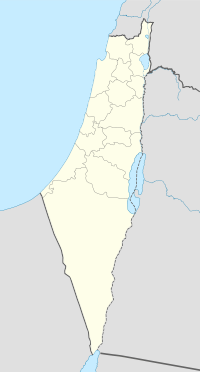Al-Na'ani
| Al-Na'ani | |
|---|---|
| Arabic | النعاني |
| Name meaning | The plant "mint" |
| Also spelled | en-Ni'aneh |
| Subdistrict | Ramle |
| Coordinates | 31°52′20″N 34°52′24″E / 31.87222°N 34.87333°ECoordinates: 31°52′20″N 34°52′24″E / 31.87222°N 34.87333°E |
| Palestine grid | 138/142 |
| Population | 1,470 (1945) |
| Area | 9,768 dunams |
| Date of depopulation | May 14, 1948 |
| Cause(s) of depopulation | Fear of being caught up in the fighting |
| Current localities | Na'an, Ramot Me'ir |
Al-Na'ani, also called Al-Ni'ana, was a Palestinian Arab village in the Ramle Subdistrict of Mandatory Palestine. It was depopulated during the 1948 Arab–Israeli War on May 14, 1948 by the Givati Brigade during Operation Barak. It was located 6 km south of Ramle.
In 1838, it was noted as a Muslim village.
An Ottoman village list from about 1870 counted 92 houses and a population of 265, though the population count included men, only.
In 1882, the Palestine Exploration Fund's Survey of Western Palestine described the place as: "A small mud village on low grownd, identified with Naamah (near Makkedah), by Captain Warren. (Joshua xv. 41.)"
In the 1922 census of Palestine conducted by the British Mandate authorities, Na'ani had a population of 1,004 inhabitants; 1,002 Muslims and 2 Orthodox Christians, increasing in the 1931 census to 1,142; 1,133 Muslims and 9 Christians, in a total of 300 houses.
A British anthropologist, writing in 1932, reported that there was a group of "Sidr" trees (see Ziziphus spina-christi and Sidrat al-Muntaha) south of the village believed to be protected by spirits.
In 1944/45 the village had a population of 1,470; 1,450 Muslims and 20 Christians with a total of 9,768 dunums of land. Arabs used 335 dunums of land for plantations and irrigable land, 9,277 dunums for cereals, while 51 dunams were classified as built-up public areas.
...
Wikipedia

